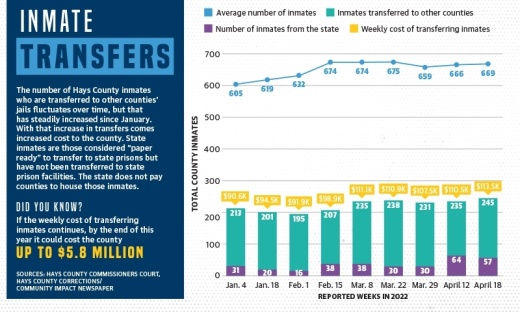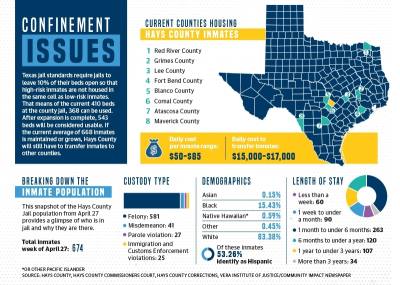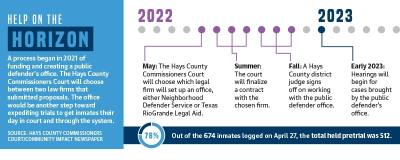Despite an increase in capacity from 332 to 603 beds after completion, the county will likely need to continue transfers to other county jails across the state as rapid population growth in the county—as well as population increases along the I-35 corridor—exceeded expectations of the number of inmates the jail would need to accommodate.
The jail’s current capacity of 410 beds actually means no more than 368 of those beds can be used, as Texas code requires a standard of leaving about 10% open to make sure high-risk and low-risk inmates are not housed in the same cell, said Chief Deputy Mike Davenport, head of corrections for Hays County.
That means once all 603 beds are ready to go, 543 beds will be the maximum amount usable. Discussion of the jail began as far back as 2010 and plans began to get underway in 2014, culminating in the 2016 bond that county voters passed, Davenport said. That bond allocated $57.5 million to construct the jail.
“We’re not done with the renovation part. I think we got some of the last key pieces in. Part of the renovation was to redo all the showers. And we finally got those last week. So hopefully there’s a light at the end of the tunnel,” Davenport said April 21.
At the beginning of discussions for the jail, Hays County’s population was 157,107, according to data from the U.S. Census Bureau. The county’s population is now estimated at more than 255,000 based on the latest estimates from the bureau.
Most recent figures from the week of April 18-24 from the county show that on average there were 212 male inmates and 33 female inmates outsourced to other county jails throughout the state on any given day. That week the county spent $113,457 on contracts with those other counties to house Hays County inmates.
“Once everything is complete, we still don’t have enough staff to bring the inmates back. Not all of them anyway,” Davenport said. “Right now, we’re averaging anywhere from $15,000-$17,000 per day outsourcing inmates.”
Hays County Corrections has more than 70 unfilled positions, and Davenport said that few, if any, applicants are applying.
The jail will also have capacity to add pods—or the flexibility to use other areas of the jail to house inmates when needed in the common areas of the jail, such as the kitchen and laundry areas, Davenport said.
“In the master plan, we’ve already got the designs for two additional pods—192 beds each. Once those two are built, that will get us up to the 1,000-bed capacity. That’s what the common areas of the jail are designed for,” he said.
Roadblocks to trial
From October 2020 to October 2021, more than 80% of inmates in the county’s corrections system were held pretrial, unable to bond out or not qualified for a judge to grant personal recognizance, according to data from the county compiled by the Vera Institute of Justice.
That figure still holds true, Davenport said. In April, out of the average of 668 inmates in the system, 27 were in on misdemeanor charges, he said.
Of those held on misdemeanor charges, Davenport said they are being held because they did not qualify for a personal recognizance bond due to criminal history or the nature of the offense (usually assault), they are suffering from mental illness and are held for their own safety or they are a repeat offender.
In order to get more of these cases to trial, one of the initiatives Hays County is pursuing is the establishment of a public defender’s office that would aid in moving cases through the courts.
“Obviously, there’s so many variables. Will a public defender’s office reduce our need to outsource? It’s possible,” Hays County Precinct 3 Commissioner Lon Shell said. “We would hope that anything we do provides efficiencies in the system overall, which should, in turn, get cases moved through the system more efficiently, resulting in less needs for outsourcing.”
The county is expected to take up two proposals in May from law firms that responded to requests for proposals issued by the county last year. One is called Neighborhood Defender Service and the other Texas RioGrande Legal Aid.
Neighborhood Defender Service operates public defender offices in New York City, Detroit and is establishing an office in San Antonio. Texas RioGrande Legal Aid operates in Austin, San Antonio and also has offices throughout South Texas and two in West Texas.
Even with a PDO to expedite and take on advocacy to get more inmates to trial, the courts are operating at max capacity, Shell said.
“We’re getting an additional district judge. The last legislative session we had one approved. That appointment comes from the governor [and] will likely happen toward the end of this year. ... So that’s important because that’s another judge that can run courts,” he said.
As the I-35 corridor becomes more populated and more people traverse Hays County, the possibilities of more individuals charged with crimes that are not local increases.
“I think we had a day where we had 34 individuals arrested this weekend. That’s pretty high, even by our historical numbers. And of those it looks like half are probably out-of-county residents. ... If the county continues to grow, there’s more traffic on [I-]35; there’s more and more people unfortunately ... doing things that result in them ending up in our jail and going through the system.”
Staffing the jail
Even if the PDO opens later in 2022 and the jail implements using pods along with the new beds, staffing will prevent the county from fully utilizing the jail, Davenport said.
With more than 70 open positions in corrections and a need to have at least one corrections specialist per 48 inmates, the county could still be in a position of outsourcing a significant number of inmates elsewhere in Texas. Davenport said most of those leaving corrections at the county are also leaving the law enforcement field entirely. Even still, the county is doing what it can to recruit.
“A lot of people that come in and request tours and stuff like that, or ended up getting a job here, the idea that they had in their head is completely different from what it is day to day,” said Lt. Erica Fernandez with Hays County Corrections. “I think a portion of it is pay. There’s a lot of other jobs that you can get out there that make similar or even more pay than a correction officer and you’re not in the same type of environment.”
It is a situation that is not unique to Hays County, said Paul Fletcher, CEO of Workforce Solutions Rural Capital Area, which provides recruitment and employment services to a nine-county region, including Hays. “We’re seeing pressure from a lot of different industries, manufacturing, health care, in skilled trades and construction being three of the biggest that are really just sucking up all the available workforce that we have,” Fletcher said.
Hays County Precinct 1 Commissioner Debbie Ingalsbe said the sheriff’s office is actively recruiting and trying to get the word out.
“They’re just really trying to think outside the box. And trying to, you know, get advertising out for these positions and working with different social media groups and working with Texas State [University] and others to see what we can do to let people know that Hays County is a good place to work and that there’s career opportunities. So we are doing all we can to try to get that word out and get people interested,” Ingalsbe said.
In a tight labor market, public sector work can lose the appeal of its stability as private sector employers can raise wages much more quickly and respond to demand in a way that the public sector cannot, Fletcher said.
“It’s tough for the government to compete when we get into a bidding war for talent. And essentially, that’s what we’re seeing just about everywhere,” he said.
“Typically, if government’s going to increase salaries, they have to go through budget cycles and to get approvals. Private sector, the boss looks at things and says, ‘I can’t hire anybody. I got to pay more,’ so they raise wages. It’s a much faster conversation.”
Zara Flores contributed to this report.








